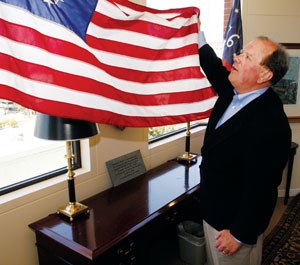SIX STORIES UP, in a building overlooking St. James Park in downtown San Jose, one finds the office of Richard Alexander, one of the city’s best-known attorneys. Since I am always interested in hidden museums off the beaten path, when I heard that the walls of his office contained numerous artifacts related to the American Revolution, and the year 1776 specifically, I had to scurry over.
After all, that particular neighborhood is San Jose’s most historical region’St. James Park was the city’s original town square a century ago’and numerous ancient stories already circulate within its environs. About a minute after I appeared in the lobby, Alexander came thundering down the hallway. “Welcome to the Democratic version of the American Revolution,” he declared, eventually pointing to a pristine model ship, the first thing one sees when stepping out of the elevator. Given to him by his wife as a 40th birthday present, it’s a replica of the Bonhomme Richard, the famous Revolutionary War ship captained by John Paul Jones’the one where he supposedly uttered the phrase “I have not yet begun to fight.”
Framed prints and etchings relating to the Revolutionary War hang from every wall throughout the office: Washington crossing the Delaware, the surrender of Cornwallis, the Battle of Bunker Hill, the first reading of the Declaration of Independence and even one print of the Battle of Québec. Several flags hang from poles throughout the front rooms, including a Bennington flag, the only one with white stripes at both the top and bottom.
As a personal-injury attorney, Alexander has handled more than his share of high-profile local cases, and his fight to hold big corporations accountable for their negligence is inspired by the American Revolution. When John Paul Jones uttered that famous line, little did he know that, a few hundred years later, a lawyer in San Jose would hold that phrase dear to his very practice. Alexander sees himself engaged in a struggle similar to that of the American colonists all those years ago.
“They were a small group of lawyers who organized and defeated the British Empire,” Alexander tells me. “They understood natural inalienable rights, they were well versed in philosophy and they took on a monster. And that’s what we do. We take on corporations like IBM and Ford.”
Alexander’s life story is far outside the scope of this column’he has been married longer than I’ve been alive’but one can easily see where his idea to collect this stuff actually came from: He went to Paul Revere Elementary School in Cleveland. He went to Nathan Hale Junior High. He went to John Adams High School. Nowadays, his current home address is 1776.
It doesn’t stop there. Both his office phone and fax number end in 1776. He says he got the idea when working with the flamboyant attorney Melvin Belli in the early ’70s. Back in those days, some telephone prefixes still began with a two-letter abbreviation, and Belli’s famous number was YUkon 11849, invoking imagery of the Gold Rush. Belli’s building on Montgomery Street in San Francisco was also located on the site of the first California meeting of Freemasons, in 1849.
That geographical fact, naturally, drove me to contemplate it all while staring out Alexander’s sixth-story office window. A gaze northward provides an up-close shot of the Egyptian ornamentation of the San Jose Athletic Club building, originally constructed by the Freemasons. In fact, I have speculated in this space before about potential Masonic influence in the landscape design of St. James Park. Many on the first San Jose City Council were also Masons.
With that, I will leave things open for the conspiracy theorists. Several books already spell out Masonry’s influence on the American Revolution. Another secret society, the Bavarian Illuminati, was revived in 1776 by Adam Weishaupt, a law professor. Perhaps Richard Alexander is one in a long line of heroes going back even farther.
Hidden in Plain Sight
Esoteric Movements conference
July 22–25 at Rosicrucian Park, San Jose




